Like running, cycling is one of those things that’s always there if you want it. I’ve never been one to join a club like Le Grange to do the group ride thing, I prefer to ride solo. It gives me space to think and be impulsive about where I go and how hard I want to push. I don’t always need to set a PR or have a daily milage goal — just getting out is often enough for me. The way my brain works, if I am moving I’m thinking deeply.
I’ve spoken before about my journey back into cycling in the past year. My sherpa through this wave of bike enthusiasm (and a previous one) has been Brendan Quirk. He’s the former interim CEO of Allied Cycle Works and self-described “close friend of the brand”. Brendan is one of the most respected people in the cycling and e-commerce worlds. He founded Competitive Cyclist which pioneered the art of selling high-end cycling gear to diehards on the internet. Side note, Competitive Cyclist had (has?) some of the best product copy of all time— taking bike-talk nerd-levels to the stratosphere. Needless to say Brendan is an incredible guy and a true connoisseur.
You probably could have guessed that an Allied bike was the best thing I bought in 2020. I’ve mentioned this before, but it’s a different experience buying an Allied. Knowing where it comes from and what goes into it makes it different. A carbon fiber bike that’s made here is a rare thing. It’s something treasured that doesn’t just get put away — it gets used and enjoyed. I wanted to dig deeper into what makes Allied so special and why making bikes as good as Allied in America is such a big deal. My Q&A with Brendan is below. Hope you like it.
ACL: Let's talk about the great bike boom of 2020. What was it like for Allied?
Brendan Quirk: It was madness, and it started that way even before Covid came into our lives.
We made the strategic decision in mid-2019 to move the Allied factory from Little Rock to Bentonville Arkansas. This was not a crosstown move. It’s 200 miles away. We moved in three phases over 5 months to minimize the impact to production. But moving a factory that far is barely-controlled chaos – especially because by moving we lost almost our entire production team.
In January and February 2020 we were deep in finalizing the Bentonville factory build, in recruiting an entirely new workforce, then training this workforce up. The training was the scariest part: Some people are born to lay up carbon fiber, and some aren’t. Going through that training-and-assessment process before the riding season kicked in (which is normally April or so) put us under a ton of pressure.
When the nationwide COVID-19 lockdown hit, we faced a 4 week spell where business came to a halt. We scrambled to raise cash (liquidating demo bikes, etc) but then before you knew it, we saw demand boom, and it’s pretty much been bonkers since then.
My two big insights from COVID-19 are the following:
The Emergency Paid Leave provision in the first big piece of Federal COVID-19 legislation was a godsend. The fact of the matter is that most factory employees work their asses off, and they’re loath to take sick time because job security is paramount, and because every dollar matters. The fact that they could be COVID-19-symptomatic, that we could encourage them to stay home, and that they saw no disruption to their personal income —and that as an employer it was so easy to administer— it was a public health miracle.
Demand for our bikes was highest in mid/late Summer, right at the time that we started to lose a good bit of production capacity because symptomatic production employees stayed at home. When we had to tell customers that their bikes wouldn’t take 4-6 weeks to make, but rather 16-18 weeks, we hardly lost a single sale. Customers could’ve justifiably been difficult and cancelled orders, but almost without fail they gave us props for taking care of our employees and patiently waited.
What's it like to manufacture in the US? I'm curious to know about unique benefits and challenges?
The benefits are many –our ability to make subtle running changes on our bikes is more akin to what an F1 team does between race weeks than what you’ll see from other bike companies with their transcontinental supply chains. Our ability to experiment, then put improvements into production is the tightest and most time-efficient in the bike industry.
It’s not just about continuous improvement, but it’s also about our new product pipeline. We can take an idea from Solidworks into reality in a fraction of the time it takes other brands. Having all aspects of ideation, testing and production under one roof leads to a better bike and a more consistently manufactured bike.
Our best-selling bike is the Able. It took less than 6 months to go from prototype to winning both the Men’s & Women’s pro fields at the Dirty Kanza. At other companies, that would’ve been an 18-month process.
Naturally there are challenges too. When it comes to what we do –bladder-molded small carbon parts– very few companies do this here. It’s labor-intensive, which lends itself (almost by necessity) to super-cheap Asian labor. The labor portion of the cost-of-goods of one of our frames is probably 10x what it is for a Specialized or Trek, which makes it brutally difficult to be cost-competitive.
The other issue is that there aren’t a ton of folks in the US who understand the difficulties of sub-scale manufacturing of bladder-molded carbon parts. The technical knowhow of our engineers and production team is formidable. But learning from others is an essential ingredient of business success (regardless of sector), and the opportunities for mentorship like that in the U.S. is rare. I always wished we could find more of that.
Do most people that buy an Allied bike know that they are made in Arkansas? Do you see it as a different value proposition?
I don’t believe Made-In-Arkansas is an important consideration for customers as they consider what bike to buy. But being in Arkansas is a huge advantage for us in the ideation and design of our bikes. For example, the Able was born from the kind of riding we do here.
We have a phrase – we call it the “Rule of Three.” That is, the perfect ride is one that’s 33% pavement, 33% gravel, and 33% singletrack. Until the Able was born, there wasn’t a bike on the market that was a legitimate weapon on all three of these.
There probably isn’t anyplace else in America with the freaky density of riding terrain we have here in Bentonville.
We’re in the Ozarks – near the gorgeous Boston Mountain range – where you can do world-class road riding and put in 10,000ft vertical days. We have nearly 300 miles of purpose-built singletrack. We are undoubtedly America’s foremost year-round mountain bike destination. And our gravel riding is lunacy. Benton County has 1,800 miles of roads, of which 900 miles are gravel.
We draw inspiration from Arkansas every day, and it comes through in how we build our bikes.
Where do you think the bike business is going in the future?
eBikes will revolutionize the industry. It’s as big of a thing in the bike biz as electric cars are to the auto industry. It will open up cycling to vastly larger audience – to people who don’t view themselves as “fit” or as “cyclists”, but who crave the childlike freedom a bike gives you.
The other interesting trend is how cycling’s relevance as a sport is starting to be overshadowed by cycling’s relevance as a utility. Cities are taking active transportation far more seriously than ever before. With more mileage of protected bike infrastructure, you’ll get more cyclists. Perceptions of safety are the #1 deterrent to more people riding their bikes to the grocery store, to school, etc. As cities solve for this, we’ll get more people taking short trips on bikes instead of cars.
As these trends continue to evolve, you’ll see significant –and very healthy— disruption in how bikes are sold. The age-old hegemony of the intimidating bike shop (the kissin’ cousin of “High Fidelity”-type record stores) will wane in the face of new business models; whether it’s the direct eCom model of Canyon or Rad Power Bikes, the franchise model of Pedego, or non-bike brands (like Harley Davidson) trying to sink their teeth into the market.
How do you approach the idea of a "brand" when running a company like this?
Historically “Made In America” as a core brand pillar was synonymous with “craft” brands like Richard Sachs of Connecticut or David Kirk of Montana (the two highest-regarded “handbuilt” bike makers in America.) A key point here is that these brands almost without fail make their frames out of steel (with a couple of exceptions like Mosaic in Boulder who uses Titanium.) These are purchases that originate in the heart, not the rational part of the brain. They’re glorious (I’ve owned two Kirks), but they primarily scratch the itch of an aesthete.
Craft and heritage and whatnot doesn’t work as a brand foundation for Allied since we’re using the most advanced material out there, carbon fiber. Our bikes (like all carbon bikes) are optimized for lightness, stiffness and durability. They are beautiful, but that’s a side benefit. Primarily it’s a brilliantly constructed performance tool for a very hard job – long days punishing yourself on gravel in the middle of nowhere.
As someone like myself who has refocused on cycling recently there are a lot of great brands out there doing cool things. What are a few you are inspired by?
Arundel: They represent the classic saying “Do one thing, and do it well.” For 20 years they’ve made the best carbon fiber water bottle cages in the world. They’re not cheap, but they’re crazy-light and they hold your bottles with a death-grip.
Kimber: Yes, the gun-maker. They make a product called Pepper Blaster I carry when I ride gravel for shooting out-of-control dogs. It’s a wicked pepper spray and one shot in the face will stop any dog in its tracks. I don’t love having to use it. But when you’re deep in the Ozarks (or wherever) it’s like a security blanket. The bad dogs here are really bad.
Strade Bianche: It’s a relatively new one-day race in Tuscany, owned by the same company (RCS) that puts on the Tour of Italy. It’s about 110 miles long, with about a third of it on this surreal white gravel. It has an absurd amount of climbing and finishes in the middle of the main square in Siena. Cycling is a romantic sport, and this is about as romantic as it gets.
Wahoo: There is a lot of tech in cycling right now. Unicorns like Peloton and Zwift, and corporate behemoths like Garmin. Wahoo was started by a couple of dudes from Georgia Tech and they’ve become leaders in on-bike GPS, at-home indoor-trainers, and a cult-favorite indoor training app called Sufferfest. In a world awash in bottomless private equity (and public market) dollars, Wahoo is growing the old-school way —slower than they need to, with complete product leadership.
Anything else we need to know?
The UCI Cyclocross World Championships are coming to the US for only the 2nd time ever in January, 2022. It’ll be held in Fayetteville, AR (Go Hogs!) and will be an amazing party and an amazing set of races. No version of the sport of cycling is as spectator-friendly (or TV friendly) as the wild sport of cyclocross. Come to Arkansas and watch it!


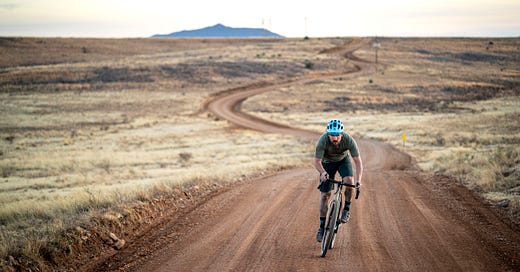


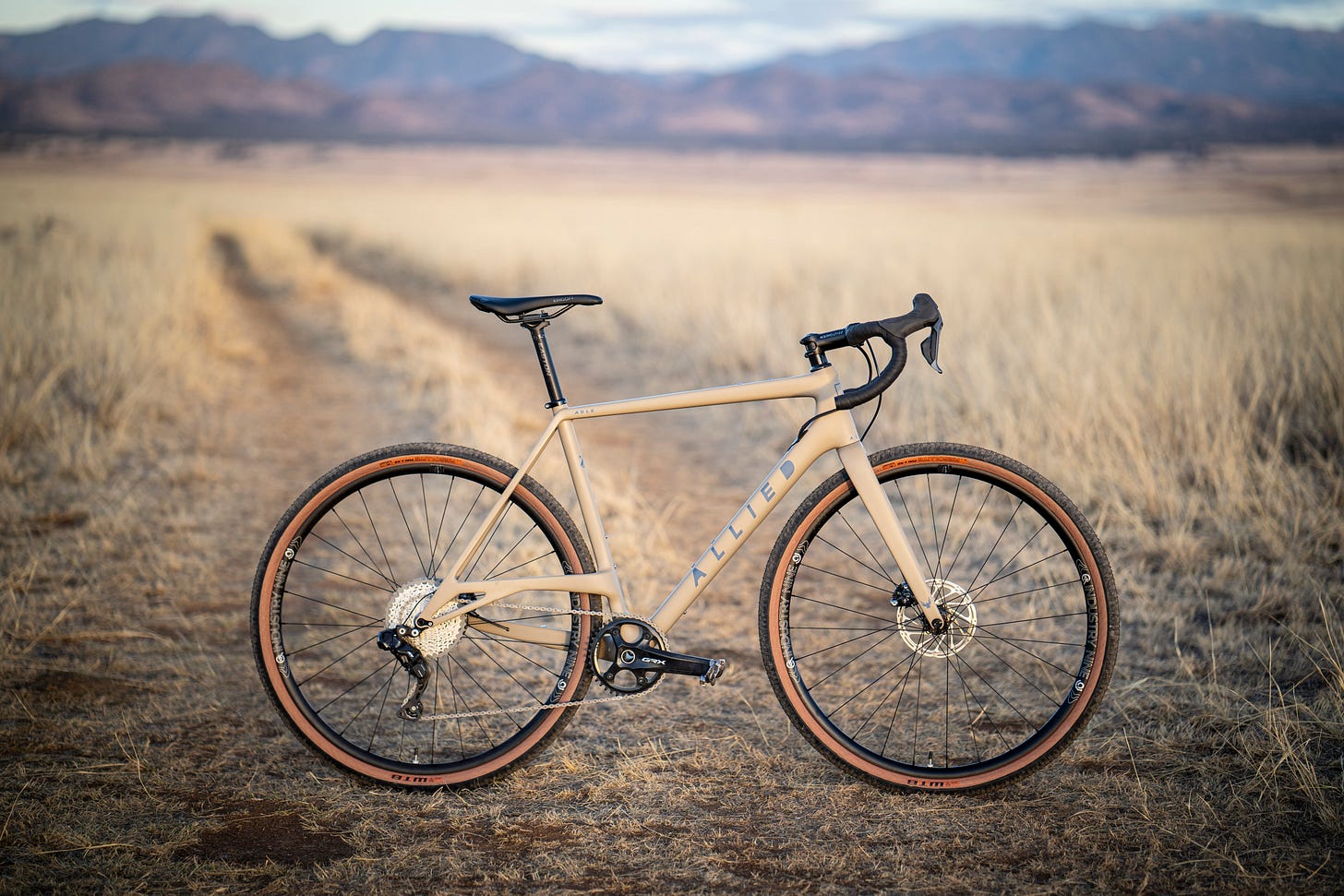
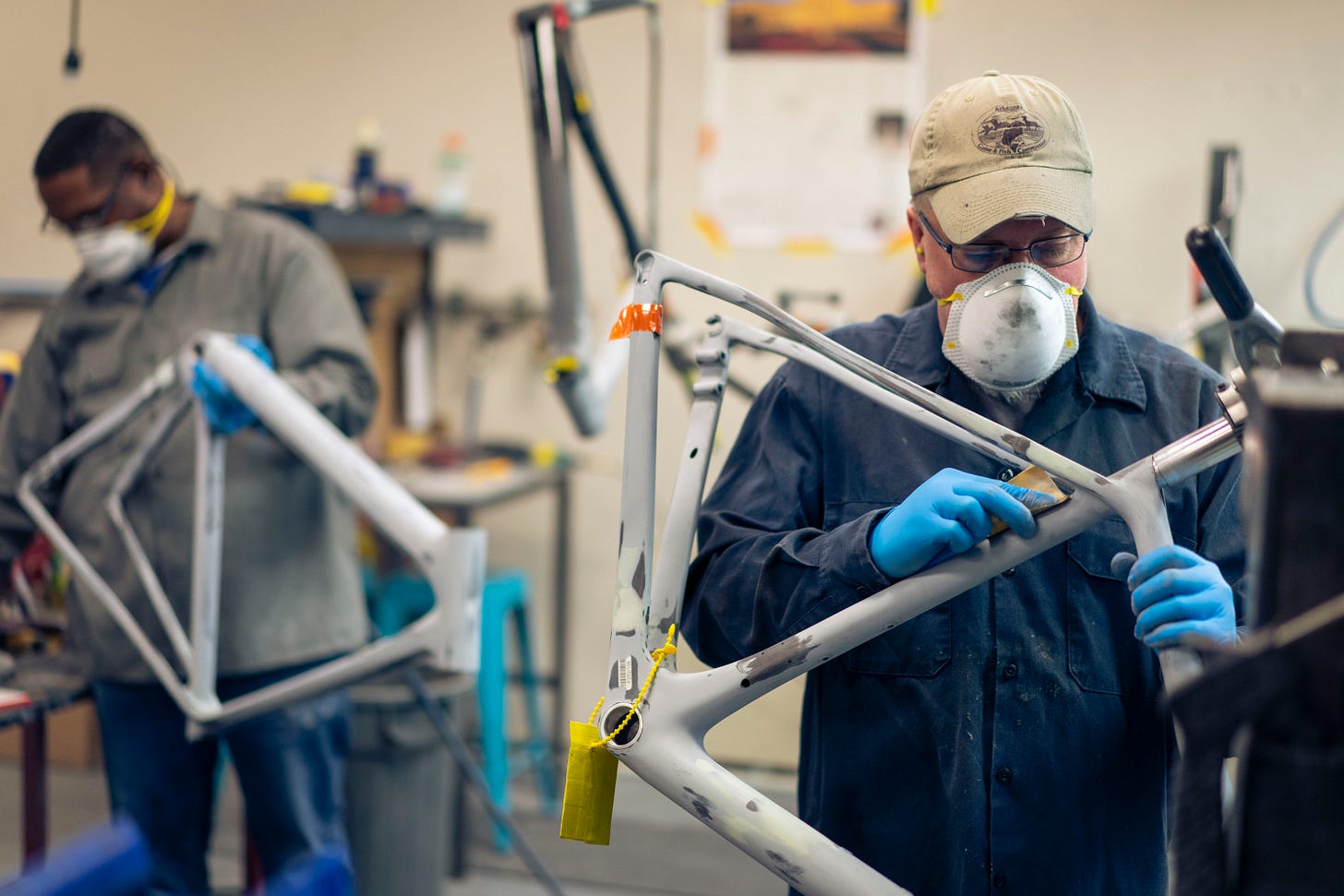

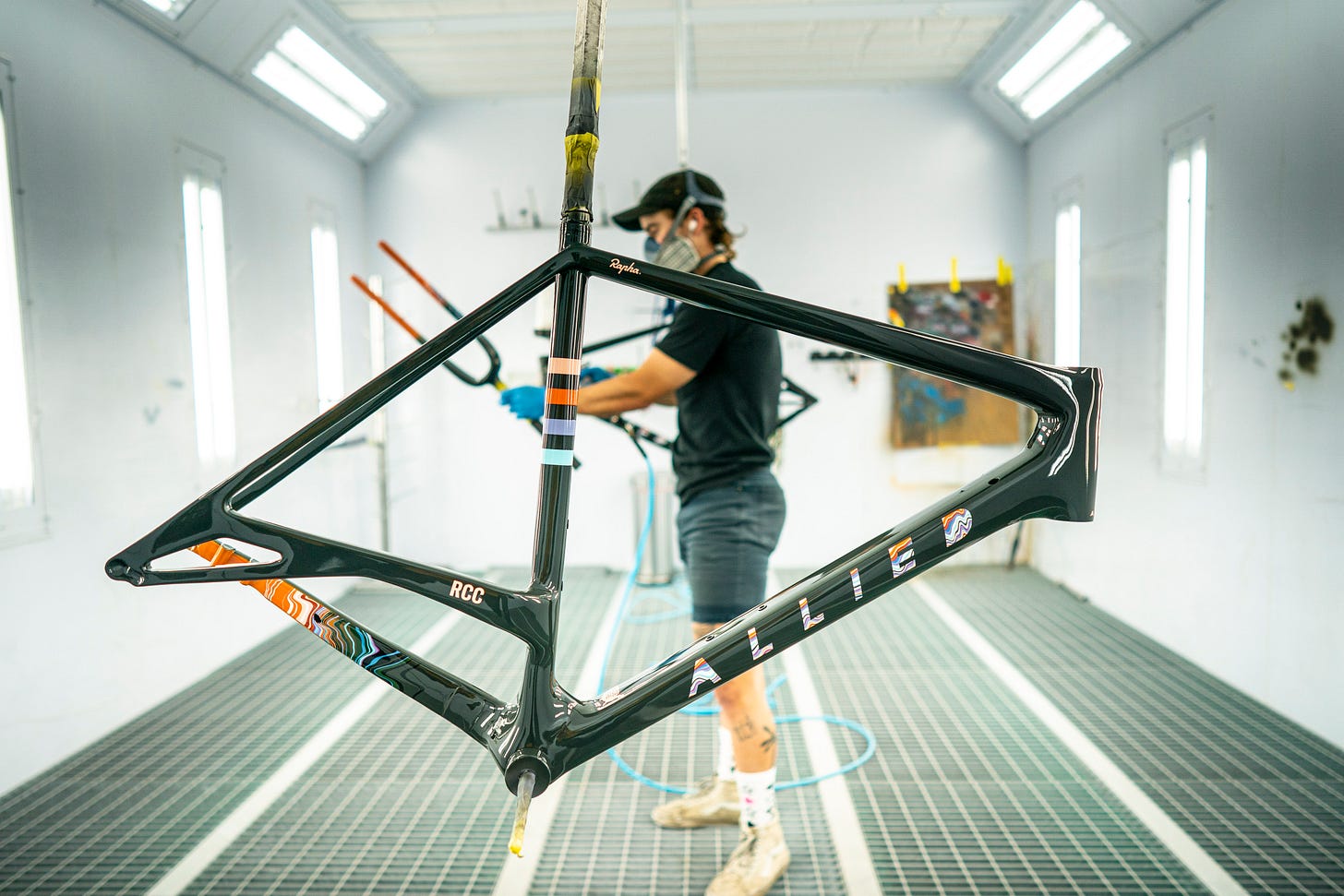

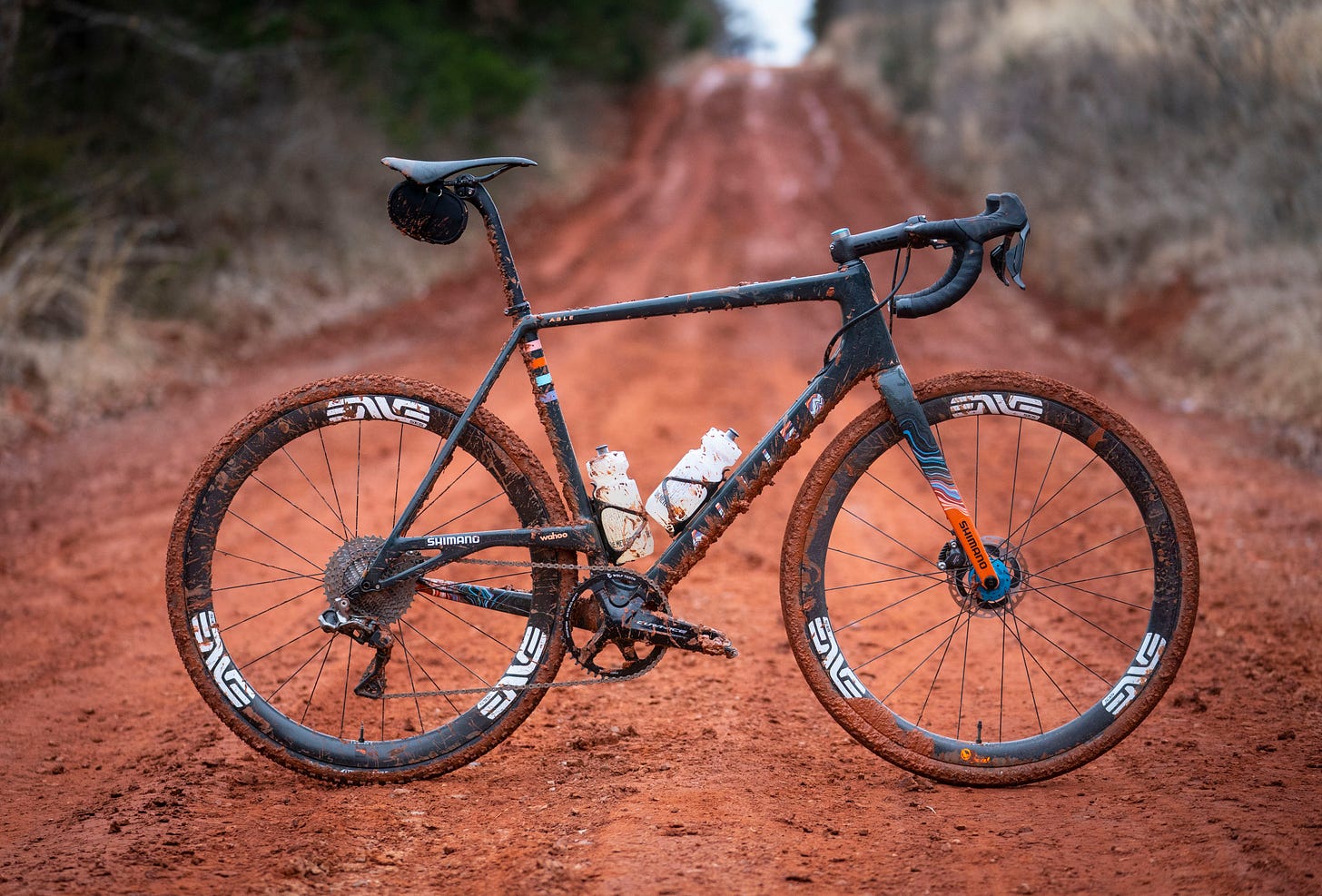
As a cyclist I love everything about this... except the characterization that steel is more form than function. Modern-day steel frames are lightweight, durable and have a ride quality many of us still prefer. But Allied carbon frames are great too!